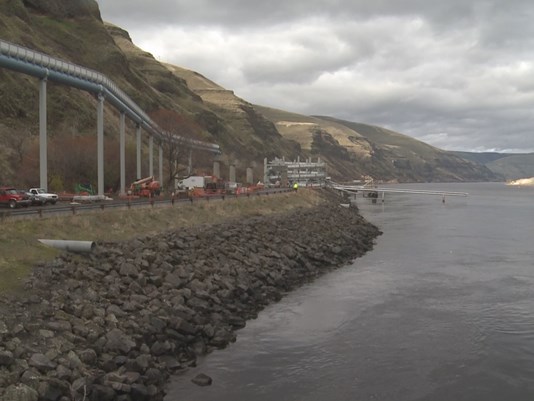forum
library
tutorial
contact

McMorris Rodgers Praises Plan that
Supports Home-state Water Infrastructure
by Staff
Ripon Advance, October 23, 2018
|
the film forum library tutorial contact |

|
McMorris Rodgers Praises Plan that
by Staff
|
 The president's recent memo calling for streamlined regulatory processes and the removal of unnecessary burdens on the Columbia River basin water infrastructure in Washington State is great news, according to U.S. Rep. Cathy McMorris Rodgers (R-WA).
The president's recent memo calling for streamlined regulatory processes and the removal of unnecessary burdens on the Columbia River basin water infrastructure in Washington State is great news, according to U.S. Rep. Cathy McMorris Rodgers (R-WA).
"I've led on legislation to protect the Columbia and Snake River System and encourage widespread collaboration in our region," Rep. McMorris Rodgers said on Oct. 19 following President Donald Trump's release that day of his Presidential Memorandum on Promoting the Reliable Supply and Delivery of Water in the West.
"Dams and fish coexist, and after more than two decades in the courtroom, we should let scientists, not judges, manage our river systems and get to work to further improve fish recovery efforts," said the congresswoman. "I'm encouraged by President Trump's action, which also meets those goals."
The presidential memorandum, among several items, also moves up the schedule for the Federal Columbia River Power System (FCRPS) Biological Opinion to 2020 from 2021 and requires increased collaboration among federal agencies to work on and release the updated opinion.
In order to address water and hydropower operations challenges in the Columbia River Basin, the U.S. Secretary of the Interior, the Secretary of the Commerce Department, the Secretary of Energy, and the Assistant Secretary of the Army for Civil Works under the direction of the Secretary of the Army, must develop a schedule to complete the Columbia River System Operations Environmental Impact Statement and the associated Biological Opinion, according to the memo.
"The schedule shall be submitted to the Chair of the Council on Environmental Quality within 60 days of the date of this memorandum," the president wrote.
Dan Newhouse (R-WA) last week said that moving up the deadline for the environmental impact statement (EIS) "is a procedural win that will give more certainty to the communities whose livelihoods depend on effective operations of our dams."
"While the Senate fails to act on our House-passed legislation to restore the collaborative framework that operates the Columbia and Snake River Power System, I am grateful to President Trump for speeding up this ongoing process," said Rep. Newhouse.
The 2014 FCRPS Biological Opinion resulted from collaboration between President Barack Obama's administration, states and sovereign Northwest tribes, according to a statement released by the lawmakers, who said the opinion has spurred record fish returns via utilization of innovative technology.
However, the opinion was overturned in 2016 by a U.S. district judge whose "anti-science court order has thrown the river system's operations into disarray and forced uncertainty upon the Bonneville Power Administration's ability to manage the power transmission system," according to their statement.
To protect the Snake River dams and ensure Washington State consumers continue to pay low power rates, the U.S. House of Representatives approved the bipartisan H.R. 3144, sponsored by McMorris Rodgers on June 29, 2017 and cosponsored by Rep. Newhouse and seven other members, including Greg Walden (R-OR), Mark Amodei (R-NV), and Kurt Schrader (D-OR).
H.R. 3144 would codify the 2014 Biological Opinion while the EIS is completed. The measure on April 25 received House approval, 225-189, and is under consideration by the U.S. Senate Environment and Public Works Committee.
The Washington State delegation also worked to include a policy rider that could impact salmon runs in the Columbia and Snake River in their home state as part of negotiations over the final spending package covering the Energy and Water Development, Military Construction and Veterans Affairs, and Legislative Branch funding bills, according to the lawmakers' statement.
"Decades of uncoordinated, piecemeal regulatory actions have diminished the ability of our federal infrastructure ... to deliver water and power in an efficient, cost effective way," Trump wrote in the Oct. 19 Presidential memorandum.
"Unless addressed, fragmented regulation of water infrastructure will continue to produce inefficiencies, unnecessary burdens, and conflict among the federal government, states, tribes, and local public agencies that deliver water to their citizenry," according to the memo.
The president called on the secretaries of the Interior and the Commerce Department to work together "to minimize unnecessary regulatory burdens and foster more efficient decision-making so that water projects are better able to meet the demands of their authorized purposes."
Related Pages:
McMorris Rodgers says Bill Promoting Hydropower, Fish Migration Will See House Action Soon by Staff, Ripon Advance, 4/4/18
learn more on topics covered in the film
see the video
read the script
learn the songs
discussion forum
